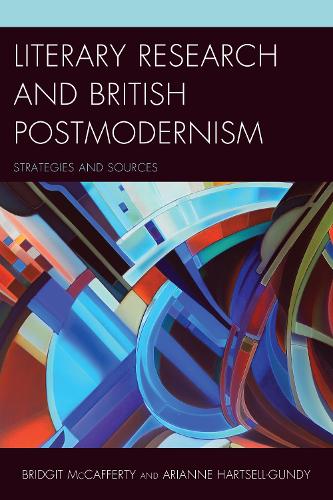
Literary Research and British Postmodernism: Strategies and Sources
(Hardback)
Available Formats
Publishing Details
Literary Research and British Postmodernism: Strategies and Sources
By (Author) Bridgit McCafferty
By (author) Arianne Hartsell-Gundy
Bloomsbury Publishing PLC
Rowman & Littlefield Publishers
3rd September 2015
United States
Classifications
Tertiary Education
Non Fiction
Literary reference works
820.72
Physical Properties
Hardback
264
Width 157mm, Height 234mm, Spine 25mm
531g
Description
Literary Research and British Postmodernism is a guide for scholars that aims to connect the complex relationships between print and multimedia, technological advancements, and the influence of critical theory that converge in postwar British literature. This era is unique in that strict boundaries between fiction, nonfiction, multimedia and print are not useful. Postmodern literature is defined by the breaking down of boundaries as a reaction to modernism and requires an innovative, multifaceted approach to research. In this guide the authors explore these complex relationships and offer strategies for researching this new period of literature. This book takes a holistic approach to postmodern literature that recognizes the way in which digital media, film, critical theory, popular music and more traditional print sources are inextricably linked. Through this approach, the authors present a broad view of postmodernism that includes a wide variety of British authors writing in the last half of the twentieth century. The books definition of postmodern includes any British literature following World War II that engages issues central to postmodern theory, including the social construction of gender, sexuality, and power; the subjectivity of truth; technology as a social force; intertextuality; metafiction; post-colonial narrative; and fantasy. This guide aims to aid researchers of postwar British literature by defining best practices for scholars conducting research in a period so broadly varied in the way it defines literature.
Reviews
McCafferty and Hartsell-Gundy intend their book to be a guide to the various methods and resources needed to conduct literary research on aspects of British postmodernism. They acknowledge the difficulty of defining both the meaning and origins of postmodernism (but fix its ranges from 1956 to the present) and denote British to mean authors from the UK and Ireland, although the authors also include a few colonies of significance..... Separate chapters outline particular resource types (encyclopedias, bibliographic tools, library catalogs, etc.) and discuss searching techniques for each. Others focus on scholarly journals, contemporary reviews, periodicals, manuscripts and archives, multimedia resources, critical theory, and miscellaneous web resources.... [C]ollections, instructors and literary studies majors may find it helpful. Summing Up: Undergraduates; professionals/practitioners. * CHOICE *
Author Bio
Arianne A. Hartsell-Gundy is the Head, Humanities Section and Librarian for Literature and Theater Studies at Duke University. She has a Master of Arts degree in Comparative Literature and a Master of Library Science from Indiana University. Her research interests include information literacy, graduate student pedagogy, collection analysis, and digital humanities. Bridgit McCafferty is the Director of the University Library at Texas A&M University-Central Texas, where she formerly acted as the liaison for the English and Film Studies programs. She has a Master of Library Science degree from Indiana University, in addition to a Master of Arts in literature. Research interests include library administration and digital libraries.
